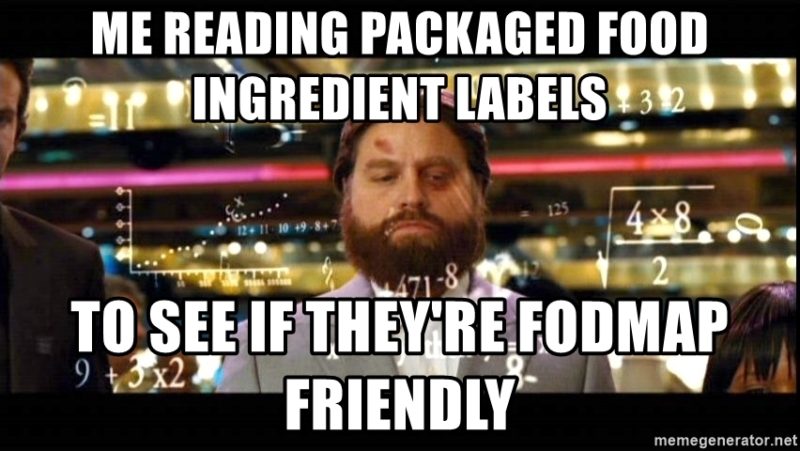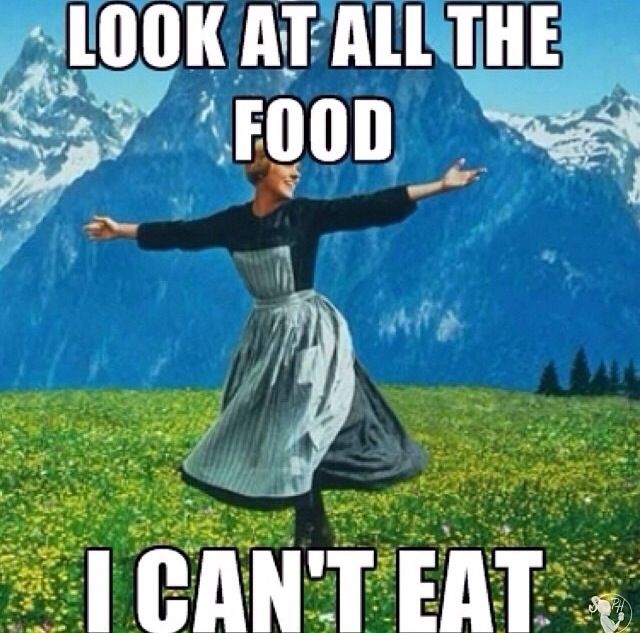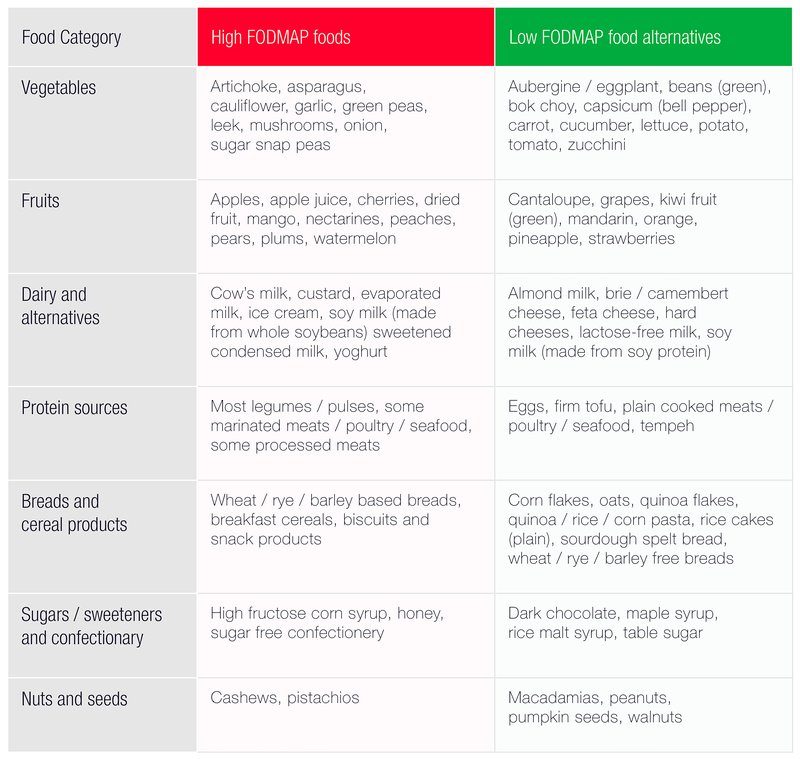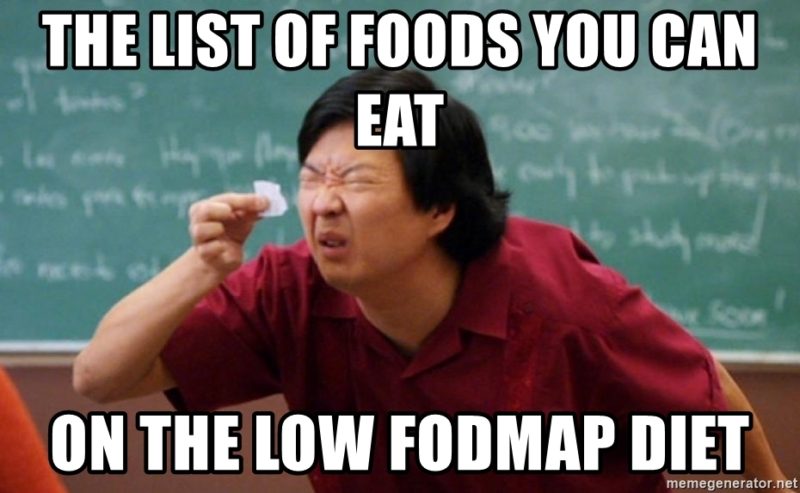If you’ve been following this blog for a while, you’ve probably seen the term “low FODMAP”. “What the heck is that?,” you mentally ask. It is essentially a diet for people with IBS and other gastrointestinal disorders.
FODMAP is an acronym for Fermentable Oligo-, Di-,Mono-saccharides And Polyols. According to Wikipedia, FODMAP occurs naturally in food. They are a short chain of carbohydrates that aren’t easily absorbed in the small intestine.
[bctt tweet=”Get the lowdown on the Low FODMAP diet ” username=”gfspirit”]
Oligosaccharides includes food such as wheat, rye, and onions. Disaccharides include milk, cheese, and yogurt. Monosaccharides are foods with fructose like mangoes, cherries and honey. Polyols includes low calorie sweeteners, apple juice, and fruits such as apples, blackberries, and plums.

The low FODMAP Diet was developed by Monash University in Melbourne, Australia.
In Nikki’s case, when she was diagnosed with IBS, she was put on medication. She wasn’t able to eat dairy, mayonnaise based dishes such as pasta or potato salad or raw vegetables. Several years after her diagnosis, she was told to cut out gluten, dairy, and soy completely. This is when she was put on a low FODMAP diet. She was given a list of high FODMAP foods (foods that trigger symptoms) and low FODMAP food (foods that she can have). As she began implementing the low FODMAP diet, she discovered other foods that triggered her not on the list. She still is unable to eat dairy but, can eat certain types of salad based foods & certain raw vegetables (she is also still gluten- and soy-free).

Eating high FODMAP foods can cause symptoms such as diarrhea, gas pains, bloating, nausea, heartburn, and indigestion. You can understand why you’d want to skip these foods and beverages. Nikki had to give up a lot of things she loved, but the pain isn’t worth it.
This is Monash Univeristy’s list of high and low FODMAP foods and beverages.

According to Monash University, the diet begins with high restrictions and then moves to relaxed diet where foods can be reintroduced gradually.
For Nikki, she has not been able to reintroduce these foods and beverages back into her diet as they still cause symptoms.

All of the recipes that are posted on GFS are low FODMAP. It can be a lot to know what you can and can’t consume. Here are a few recipes that you might enjoy: pancakes, lasagna, pizza, pumpkin cupcakes, and nice cream.
Here are some helpful food guides: yogurt alternatives, breakfast foods, snacks, and even Halloween candy.
If you sign up for my mailing list, you’ll receive a FREE Beginners Guide to Dietary Restriction Friendly Essentials Checklist.
As always, sharing is caring. Make sure to follow GFS on social media utilizing the handy dandy buttons below.
Disclaimer: if you think you can benefit from a low FODMAP diet, do not start it without consulting your physician.

I’ve honestly always wondered what this meant and had no idea! Thanks for sharing this!
Glad that you found it informative, Shannon! 🙂
Glad to learn about “low FODMAP”. I never knew someone out there who experience this. Glad that you have a list of things that they can eat. Pretty helpful.
Thank you! I’m glad that you found it helpful. 🙂
I had no idea what the low fodmap meant until now. Thank you for sharing — I thought this was very informative ??
I’m really glad that you found it informative, Annick! 🙂
I’ve never heard of this before. We don’t really have restrictions when it comes to food, in our home.
I had never heard of it before my sister had to start following this diet.
Wow, I have never heard of this before. I eat almost every vegetable on the high Fodmap list. I guess I will be making some changes.
Thanks for enlightening us! Sometimes these jargons may be difficulty to understand but I like how you have explained this terminology.
You’re welcome, John. I like to try to make things more understandable and clear.
I’d heard the term FODMAP but didn’t know what it meant really. Thanks for this, it is really informative.
You’re welcome! I’m glad you found it to be informative. 🙂
Thank you for this informative post. I never knew what that jargon meant. Now I know!!
I’m glad I could help, Kim! 🙂
I think it’s great that you highlight issues that people who are dealing with food allergies, have to deal with on a daily basis! We have some friends who are sensitive to certain foods, and I’ve referred them to your blog!
Thank you, Sara! Sometimes, you really have no idea until you or someone you know experiences. We’ve learned so much that we never really even thought about before my sister had to make these changes. Thank you so much for referring your friends!
This is such a great list. We are always trying to eat healthier.
Being a vegetarian who sometimes eats vegan, I know all too well how hard it is sometimes finding things we can eat while dining out or simply being away from home. This list is going to help so many with making better food choices when they’re away from their comfort zones. Being knowledgeable and prepared is much of the battle.
Kisha, I’m sure you understand the struggle well. I agree that having as much info as possible makes it easier to make better choices.
I’ve never heard of this before. This is so informative and I’ve learned something new today. Thanks for sharing!
I’m glad you found the post to be informative! 🙂
I’ve never heard of this before. Low foodmap is new to me.
I had never heard of it before my sister had to start following it.
Haha you really do learn something new everyday!!! I’ve always heard this term but never really knew what it ment!
I’m glad I could further your knowledge! haha
Learning about FODMAP diets and their relevance to gluten sensitive eaters is an educative process for me. I am now better able to appreciate the nature of glucose intolerance and to realize that it is not something to be taken lightly. Learning that high FODMAP foods trigger symptoms and that the glucose intolerant can have low FODMAP foods. Your post has made me a aware person.
Ingrid, I’m so glad that you found this post informative and that it helped you have a better understanding for Low FODMAP and gluten sensitivities.
Very informative post on FODMAP, I had no idea what that meant prior to reading your post.
Thanks, Cecilia! I’m glad you found it to be informative. 🙂